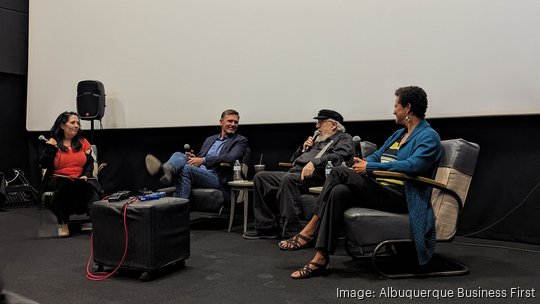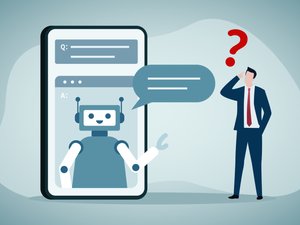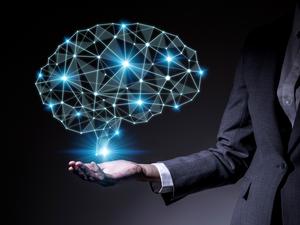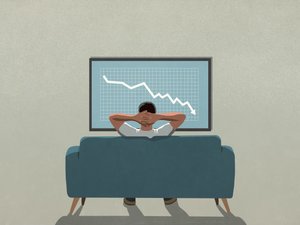
George R.R. Martin, the acclaimed author of the "Game of Thrones" series of fantasy novels, recently said that the benefits of using artificial intelligence could become a "David and Goliath" type of contest between small creators and large corporations — not unlike, for example, the creators of massively popular characters like Superman and Spider-Man.
At a panel in Santa Fe on Friday, Oct. 13, Martin was joined by U.S. Senator Martin Heinrich (D-N.M.) and Melanie Moses, a professor in the department of computer science at the University of New Mexico, for a fireside chat on artificial intelligence (AI) and the future of the creative economy at the Violet Crown theater. Julia Goldberg, senior correspondent for the Santa Fe Reporter, moderated the chat, which drew a full theater full of media and interested guests.
How AI might impact copyright law and change how information is shared and consumed on social media sites were major themes addressed by the panelists throughout the discussion. Martin referenced Jerry Siegel and Joe Shuster — the co-creators of Superman — as well as Jack Kirby and Steve Ditko, two artists who helped create Spider-Man, as examples of creators who didn't see the full benefits of what they made because of copyright ownership contracts.
"We've got a David and Goliath here," Martin said. "We're a lot of Davids who are getting together. But AI is being pushed and is being used by huge corporations, by Disney and Warner Brothers and all of that, they're looking into it. … It's individual human beings who are fighting them."
"The copyright law is a very valuable part of history, but effectively, if you study the history of the creative arts, copyrights are not owned by individuals who created them, they're owned by the corporations they were sold to," he continued. "And sometimes for unfavorable terms."
Heinrich made a tangential point in regard to risk when asked about the balance between crafting strong regulations and allowing individuals or companies to use AI in the most effective ways possible. Ensuring innovation is allowed to continue is a key part of that balance, he said.
The senator also referenced the Creating Resources for Every American To Experiment with Artificial Intelligence, or CREATE AI, Act — which he and a bipartisan trio of senators introduced this summer — in his response.
"I think you want to incentivize innovation, which goes back to the CREATE AI bill that we've put together. But the application, when there is a substantial amount of risk involved, that's when you want a regulatory framework to apply," Heinrich said. "And so I think that's the lens that policymakers should view this through."
The United States, he added, has a "structural advantage" because of advanced research institutions and technological talent throughout the country. Those institutions and that talent, in turn, have given the U.S. the "lead" in AI advancement.
"We should use that to maintain that lead," Heinrich said. "At the same time, there are huge risks involved to individual's lives. So when that threshold gets crossed, that's when you want to make sure you have a regulatory framework in place to be able to address these things."
He referenced automation like self-driving vehicles as one example.
"If you're going to have AI driving a car, then you need to have a threshold that says, 'Here's what we expect in terms of safety before you can do this,'" Heinrich said.
Startups like Cruise and Waymo have pioneered the autonomous vehicle field, specifically. But Moses, the UNM professor, referenced a different well-known company when talking about the use of data in training AI models.
"There are companies who call themselves things like 'OpenAI.' But the data they train their models on is not open," Moses said during the chat.
Artificial intelligence and machine-learning models — what are essentially super complex algorithms — require massive amounts of data to produce information or images. How that data is handled is another sort of "David and Goliath" problem, according to Moses.
"The data that train these models is just another source of corporate power," she said. "There's no reason not to reveal what it's trained upon so people can look and see 'was my data used to train these models, and if so, I should have the right to remove it.'"









